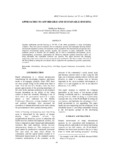| dc.contributor.author | Rahman, Mahbubur | |
| dc.date.accessioned | 2010-10-12T03:40:05Z | |
| dc.date.available | 2010-10-12T03:40:05Z | |
| dc.date.issued | 2009 | |
| dc.identifier.uri | http://hdl.handle.net/10361/458 | |
| dc.description.abstract | Squatter settlements provide housing to 30-70% of the urban population in many developing countries. They have grown enormous due to widespread poverty and inadequate housing finance and land development systems. Governments mostly assisted by the international aid agencies have improved environment, tenure security, income and resources in many settlements. Yet the problems persist as benefits did not multiply due to lack in institutional development, policy implementation, governance, participation etc. Moreover, that the squatters themselves often can bring affordable and sustainable solutions was ignored. This paper discusses the changing approaches to the issues of low-income groups housing worldwide in the above context. The role of the word Bank in setting the core themes and its support for the spontaneous growth is particularly examined. | en_US |
| dc.language.iso | en | en_US |
| dc.publisher | BRAC University | en_US |
| dc.relation.ispartofseries | BRAC University Journal, BRAC University;Vol.6, No.2,pp. 49-62 | |
| dc.subject | Affordability | en_US |
| dc.subject | Housing policy | en_US |
| dc.subject | Self help | en_US |
| dc.subject | Sqatter settlement | en_US |
| dc.subject | Sustainability | en_US |
| dc.subject | World Bank | en_US |
| dc.title | Approaches to affordable and sustainable housing | en_US |
| dc.type | Article | en_US |

